Green At the 2014 Ballot Box
Air Date: Week of November 7, 2014
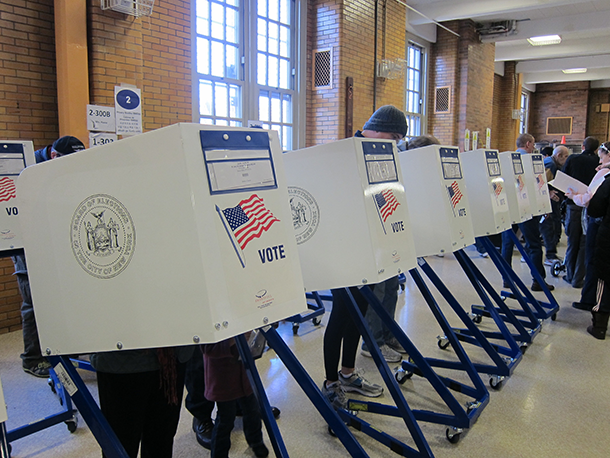
On Tuesday November 4th, 2014, Americans around the country voted in the midterm elections. Millennial voters (under 30 years old) accounted for only 12% of the turnout. (Photo: Joe Shlabotnik; Flickr CC BY-NC-SA 2.0)
Host Steve Curwood and Peter Dykstra assess some environmental lessons from the 2014 midterm elections, discussing the effects of money spent by green activists, its effect on the races and some of those who lost their jobs. Also, Living on Earth reporters round up the fate of energy and environmental ballot initiatives.
Transcript
CURWOOD: From the Jennifer and Ted Stanley Studios in Boston and PRI, this is Living on Earth. I’m Steve Curwood. While many news organizations look at the recent elections in terms of blue and red — Democrat and Republican — we consider the results in terms of green—how the voting relates to environmental concerns. It turns out that in 2014 there were plenty of environmental measures on ballots across America, and we’ll have more on them in just a few minutes. But right now we turn to the Daily Climate’s Peter Dykstra for an ecological assessment of the races. Hi there, Peter.
DYKSTRA: Well, hi, Steve. It definitely was a clear message in this election. And after unprecedented spending by the environmental side, and unprecedentedly strong organization by environmental groups in the election campaign there’s very little to show for it from Tuesday’s election. Anybody who cares about such things already knows the headlines – the Republican Party reclaimed a majority in the Senate, Democrats lost some presumably safe Governors races, and more.
CURWOOD: Right, and all that spending you mentioned came from deep-pocketed activists like Tom Steyer. And you wrote about this in The Daily Climate before the election.
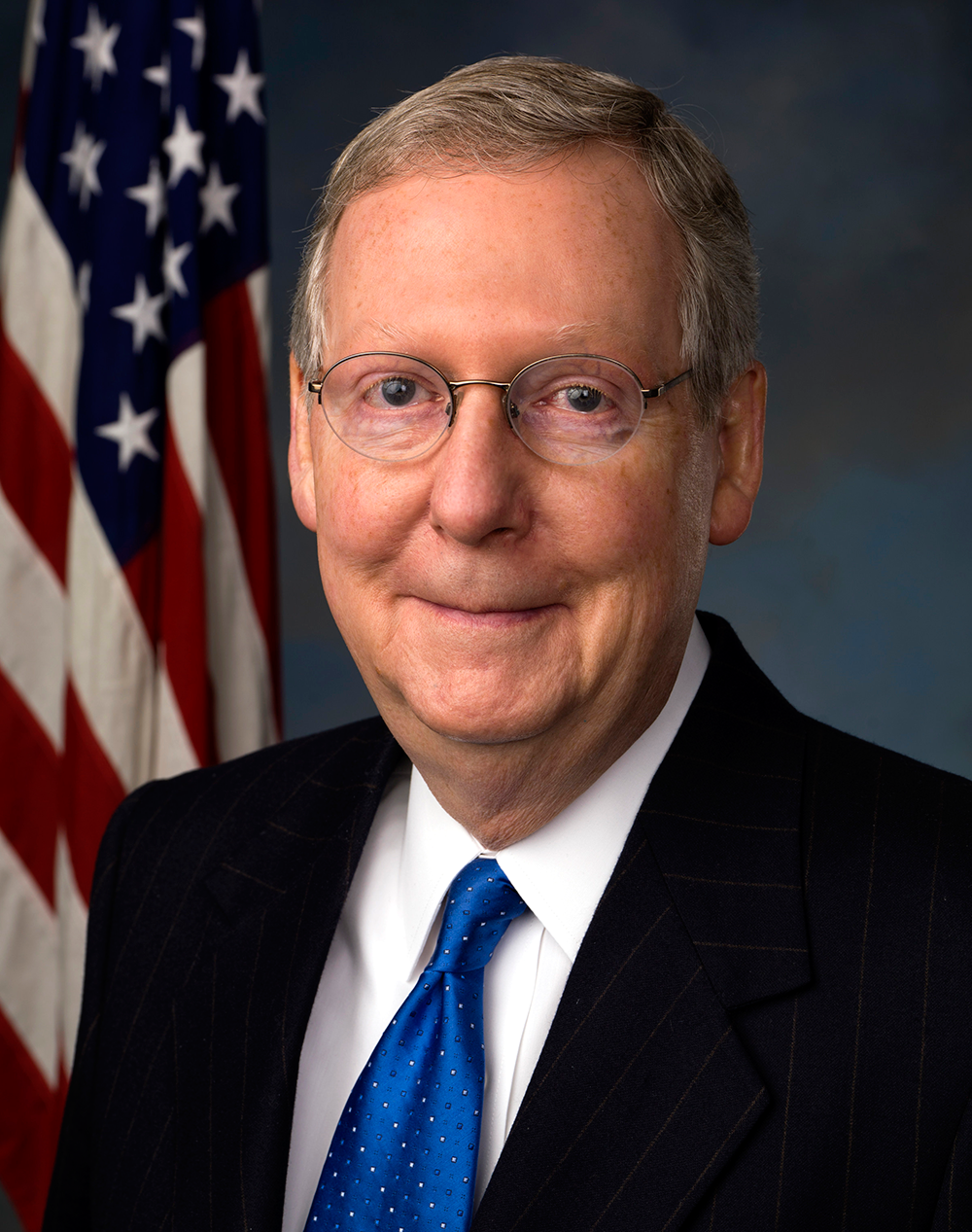
Mitch McConnell is the likely new Senate Majority Leader and a re-elected Republican Senator from Kentucky. (Photo: Official Senate portrait/US Congress)
DYKSTRA: I did, and Tom Steyer is the venture capitalist turned political force on climate and other green issues. It made for an interesting story, but it’s one that inside-the-beltway journalists consistently got wrong. There were numerous pre-election stories pairing Steyer against the much, much deeper pockets of the Koch Brothers. It created a nice narrative but a false balance, and some people fell for the line that the political power of Big Oil had finally met its match in the political power of Big Green. It’s not gonna happen any time soon, folks. The power and reach on the environmental side can’t begin to match the dough behind the anti-science, anti-regulatory, anti-environment causes. And to me, there’s one example of this that makes a far more interesting story than either the Kochs or Tom Steyer.
CURWOOD: Oh, and who’s that?
DYKSTRA: Joe Ricketts, the founder of TD Ameritrade, co-owner of the Chicago Cubs and the money behind a PAC called EndingSpending. Ricketts focused millions on Senate races much of it on Michigan, New Hampshire, and Georgia. In particular, the Michigan race ads criticized Gary Peters over the Keystone XL Pipeline. He also ran attack ads against Jeanne Shaheen in New Hampshire and Michelle Nunn in Georgia, all Democrats. Nunn lost, but Peters and Shaheen were two of the Democrats’ bright spots, so Joe Ricketts, in the fashion of his Chicago Cubs, lost two out of three.
CURWOOD: OK, Peter, but let’s stay with the Keystone pipeline for a moment. Republicans have made approval of this pipeline to carry tar sands oil from Canada to refineries along the Gulf of Mexico a top priority.
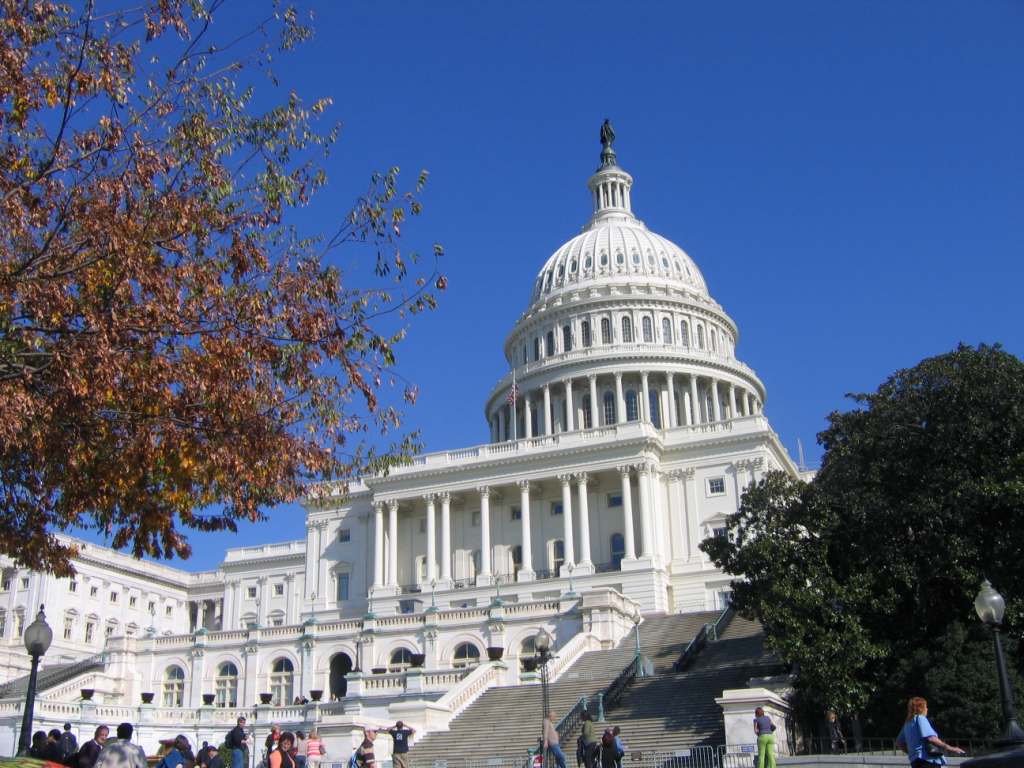
Many seats in the US Senate and House of Representatives were up for grabs in the 2014 midterm electoral race. (Photo: Rob Crawley; Flickr CC BY 2.0)
DYKSTRA: Yes, and in their victory speeches this week the new Senate Majority Leader Mitch McConnell and Republican Party Chair Reince Preibus made it clear that they’ll push for Keystone even as some in the oil industry seem to be backing away from tar sands. Meanwhile, out in Nebraska where there’s a pitched battle over Keystone, one of its biggest Congressional boosters lost a close race: Lee Terry, an eight-term Republican, was surprised by a challenge from Democrat Brad Ashford.
But in reality, control of the Senate might be more symbolic than anything else, though. The Republican-controlled House the past few years has gotten obsessive over things like Obamacare, passing the same repeal bill over and over again, knowing full well that it won’t survive the Senate or a Presidential veto. The Senate may now jump into the same trench, passing symbolic bills to de-fund or maybe even abolish EPA, to build Keystone, and other environmental issues.
CURWOOD: Yeah, but, Peter, you just pointed out that Obama has that veto pen.
DYKSTRA: Yes, and the risk is that this election sends a message that the Democrats didn’t see much positive, and the increasingly environmentally-hostile Republicans didn’t see much of a downside, in taking sides on the environment. If President Obama reads those political tea leaves, the Keystone pipeline is as good as built. But if, like a lot of second-term Presidents, he wants to leave a legacy that in this case includes climate change action, he might kill the pipeline or leave it in the lap of the next President.
CURWOOD: Thanks, Peter. Come back a little later in the show and we’ll talk a few election day specifics.
DYKSTRA: OK.
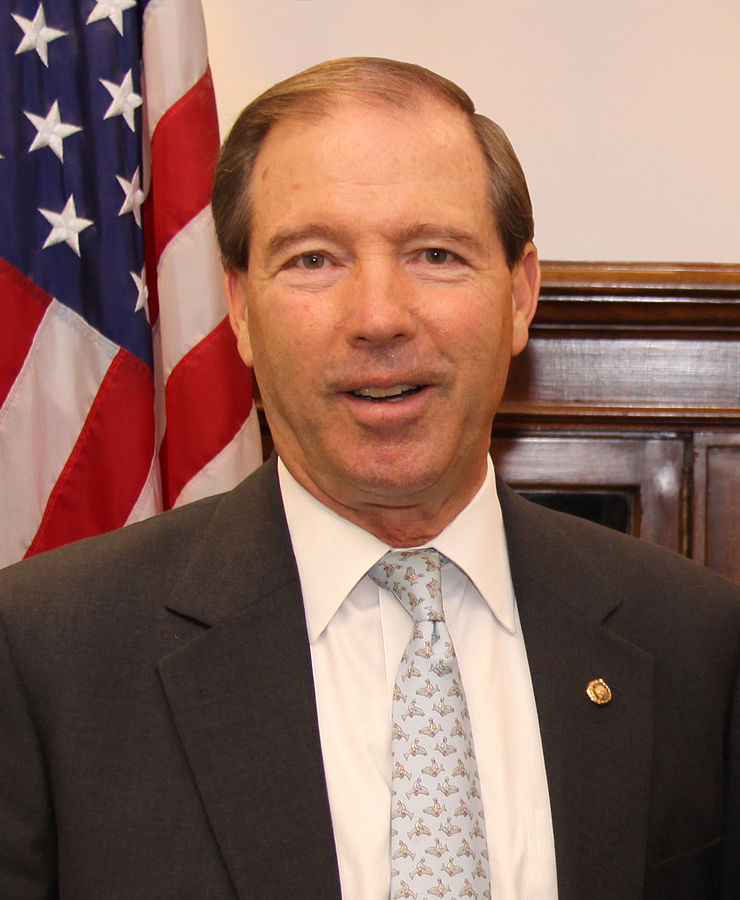
Democrat Tom Udall ran for Senate reelection in New Mexico and won. His cousin, Mark Udall, ran in Colorado, but lost to Congressman Cory Gardner. The Udall family is known for supporting environmentally-friendly legislation that protects natural resources and promotes renewable energy. (Photo: US Senate)
CURWOOD: There were environmental initiatives on the ballot in some states, but not much of a pattern to the results. Maine and Michigan took on hunting. In Maine, voters said it’s ok for hunters to use bait when hunting bears, but Michigan rejected wolf hunting in a vote that’s likely to end up in court as the legislature had already approved that method of population control. Massachusetts refused to extend container deposits to bottled water, while Berkeley, California, approved a soda tax. And the question of labelling GMO ingredients was back again – Living on Earth’s Naomi Arenberg has been looking at what happened.
ARENBERG: There were two statewide referenda to require GMO labeling, each of which failed. In Colorado 66-percent weighed in against Proposition 105, as opposed to only 34 percent in favor. The vote in Oregon, though, was so close that Measure 92 was not decided until Wednesday afternoon, and then with less than 51 percent bringing it down. I might add, Steve, that both sides broke spending records for Oregon ballot measures.
CURWOOD: Interesting. So what about the other two GMO-related votes?
ARENBERG: These were countywide initiatives. Northern California’s Humboldt County has – I’m quoting, here – prohibited “the propagation, cultivation, raising, or growing of genetically modified organisms.” Farming is not the big business in Humboldt that it is in other parts of California. That said, the other successful measure WAS in an important agricultural region. Maui County in Hawaii might be best known as a tourist destination, but actually it’s an important agribusiness research center for Monsanto and Dow, and that’s for the same reason it’s a vacation spot—weather. The growing season lasts all year long, and both Dow AgroSciences and Monsanto are heavily invested in seed development there.

Tom Steyer is a venture capitalist, philanthropist and environmentalist. He donated large sums of money to environmentally-minded politicians running in the 2104 elections. (Photo: Helloaloe; Wikimedia Commons SA 3.0)
CURWOOD: Naomi, you mentioned big money involved in Oregon’s close vote. What about Maui?
ARENBERG: Well, we know that GMO supporters spent nearly $8 million, or over $300 for every vote against the ban.
CURWOOD: And all that money wasn’t enough?
ARENBERG: Nuh uh, but it was very close. The ban passed by only a couple of percentage points. It seems like grassroots organizing made the difference. Residents in Maui County took to the streets, carried signs, knocked on doors, and they called friends to talk about Monsanto’s and Dow’s agricultural practices.
CURWOOD: So what exactly did the “yes” voters get?
ARENBERG: They got a temporary ban on genetically engineered crops, which stays in effect until the county council reviews safety studies, to determine the potential environmental or health threats of GMO plants. And the research is being paid for – are you ready for this Steve? – by the seed companies.
CURWOOD: Why am I not surprised? Thanks, Naomi.
Well other ballot questions took on land use and the protection of natural resources. Living on Earth’s Helen Palmer has been checking up on them.
PALMER: Yes, several states had these issues on the ballot - New Jersey, Florida, North Dakota, Louisiana, Alaska. Most of the initiatives were successful. Florida’s Amendment 1, to devote a third of excise taxes to wildlife, fish, forests and the like; Louisiana’s Amendment 8 that ensures the money in the state’s Artifical Reef Fund really goes to building reefs in the Gulf; and in New Jersey, voters approved an amendment to guarantee funding to buy and preserve open space and farmland.
CURWOOD: Those also sound very green.

Massachusetts refused to extend container deposits to bottled water. Berkeley California approved a soda tax. (Photo: Nick; Flickr CC BY 2.0)
PALMER: Yes, but some environmentalists worry that the New Jersey measure could drain money from other environmental priorities, like cleaning up toxic waste sites in the Garden State. North Dakota’s Measure 5 would have devoted some oil revenue to clean water, parks and wildlife, but it was thumbs down for that. And Maine and Rhode Island passed successful bond measures for water, wetlands, and other environmental projects, and two thirds of Californians voted to devote over $7 billion to improving the golden state’s water supply and quality.
CURWOOD: Nothing like a drought to concentrate the mind, and loosen the purse strings.
PALMER: Yes, and finally Alaskans voted to give the state legislature greater veto power over mining projects in Bristol Bay. You’ll remember Steve, that’s where the controversial Pebble Mine is proposed, and critics say that threatens the Bay’s massive salmon fishery.
CURWOOD: Thanks, Helen.
PALMER: Sure.
CURWOOD: Now there were a number of bans on hydraulic fracturing for natural gas on the ballots. Living on Earth’s Emmett FitzGerald has been following those.
FITZGERALD: Yeah, the one that’s getting the most attention is Denton, Texas, where 59 percent of the electorate voted to ban fracking from the city. It’s a pretty shocking result when you consider that Denton is a solidly Republican town in the middle of the Barnett Shale formation, where fracking technology was first developed. The oil industry spent nearly $700,000 fighting the bill, but they were defeated by a grassroots campaign of locals who were tired of the noise and the fumes from over 270 natural gas wells operating within city limits. Anti-fracking activists around the country are hailing this as a victory in the heart of oil country.

Corn is a crop that agricultural companies often genetically modify. There were two, state-wide referenda to require GMO labeling in Colorado and Oregon, both of the measures failed. Two other county-wide initiatives in California passed that prohibit, “the propagation, cultivation, raising, or growing of genetically modified organisms.” And Maui, Hawai’i voted in a temporary moratorium on all genetically modified crop production until the local council is satisfied with safety testing. (Photo: Dodo-Bird; Flickr CC BY 2.0)
CURWOOD: Hmmmm...now, where else was fracking voted on in this election?
FITZGERALD: Four towns in Ohio voted on fracking bans, although only one actually passed, that was Athens, Ohio. And then there was California. Earlier this year the California senate narrowly rejected a statewide moratorium on fracking, but in this election it was back on the ballot in a number of counties. San Benito and Mendocino Counties voted to ban fracking, while Santa Barbara voters gave it the go-ahead.
CURWOOD: Now, I hear there was another interesting local race in California, tell me what happened in Richmond.
FITZGERALD: Well during this campaign cycle the oil company Chevron poured $3 million dollars into local races there. A lot of that money went to ads attacking politicians who have been critical of Chevron’s refinery in Richmond. The refinery is the largest employer in the city, but many people are concerned about safety standards and the impacts on public health. A fire at the refinery in 2012 sent 15,000 Richmond residents to the hospital with respiratory problems. In their effort to elect industry-friendly candidates Chevron created its own local media outlet, the Richmond Standard, which pumped out pro-refinery stories throughout the election cycle. But in the end this elaborate and expensive strategy backfired, as the city elected a slate of progressive refinery critics, including new mayor Tom Butt.

Many ballot measures in the 2014 midterm election helped buy and preserve land and protect natural resources. Florida’s Amendment 1 devoted a third of excise taxes to wildlife, fish, forests; while Louisiana’s Amendment 8 delegates money from the state’s Artificial Reef Fund to building reefs in the Gulf. New Jersey voters approved an amendment to guarantee funding to buy and preserve open space and farmland. (Photo: Marc AuMarc; Flickr CC BY-NC-ND 2.0)
CURWOOD: Thanks, Emmett, and we’ll get back to you later in the program with more about fracking.
But now Peter Dykstra joins us again with more observations on the midterm elections and the environment. Peter, there was some big news for an American political/environmental dynasty last Tuesday, huh?
DYKSTRA: There was. Mark Udall lost a close re-election bid to Colorado Congressman Cory Gardner. His cousin Tom Udall won re-election to the senate in New Mexico. Their respective Dads, Mo and Stewart Udall, were environmental champions in the last half of the 20th Century, Mo as a Congressman and Presidential candidate, Stewart as Interior Secretary for Presidents Kennedy and Johnson. But Mark Udall’s defeat was one of the bigger Senate losses for the Democrats, it was far from the only one though.
CURWOOD: Hey, Peter, let’s talk a bit more about something you mentioned earlier. There doesn’t seem to have been a downside for members of Congress who are downright hostile to environmental protection.
DYKSTRA: Senator Jim Inhofe of Oklahoma, who has called climate change a “hoax,” had token opposition and won re-election by almost 40 percentage points. Lamar Smith, the Chair of the House Science Committee who calls himself a skeptic on climate change but actually he talks a pretty good denial game too, ran unopposed. Now both the Senate and House committees that deal with science, environment and climate will be chaired by folks who just can’t be bothered with science.
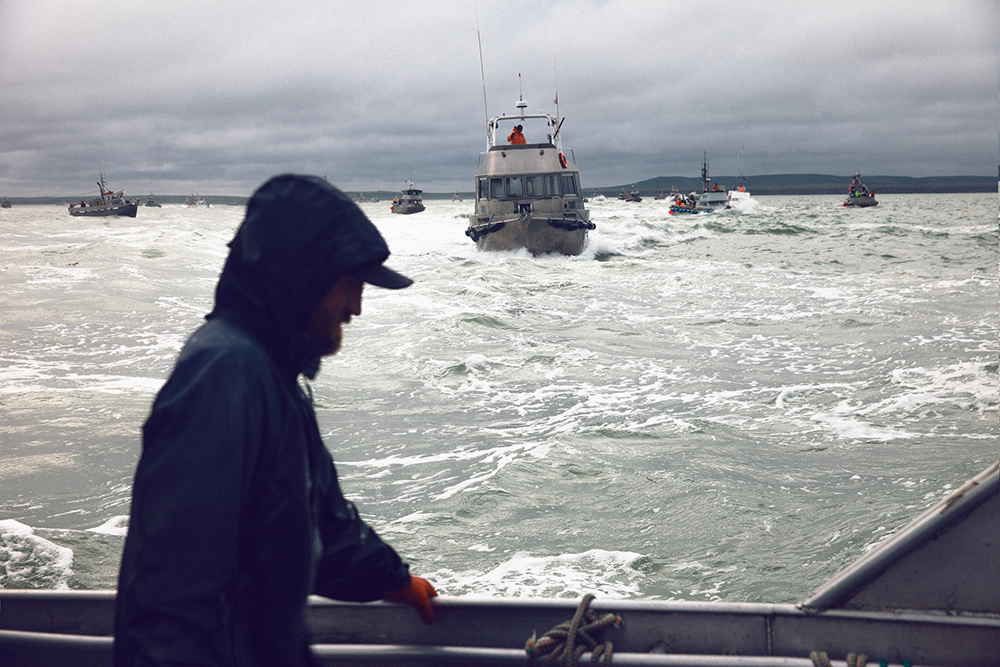
Alaskans voted to give the state legislature greater veto power over mining projects in Bristol Bay, where the controversial Pebble mine is proposed. Critics say that the mine threatens the Bay’s salmon fishery. (Photo: Chris Ford; Flickr CC BY-NC 2.0)
And while some fierce environmental opponents got through without serious election opponents, even some Democrats ran their campaigns like they’d rather be photographed next to a railcar full of hydrocarbons than next to Barack Obama. Alison Lundergan Grimes tried to out-coal Mitch McConnell to score votes in pro-coal eastern Kentucky, but McConnell ended up winning easily. In Louisiana, Senator Mary Landrieu – another defender of hydrocarbons on the Democrat side - finished second and faces an uphill fight in a run-off vote next month.
CURWOOD: So, is it retrenchment all the way for environmental priorities?
DYKSTRA: Quite possibly. But a couple of numbers about this election really struck me. First, by now I’m sure we’re all already missing the flood of blood-curdling attack ads. The Center for Public Integrity calculated that the US Senate races alone spawned - get this number - 908,000 TV ad placements. And that’s just the broadcast stations, it doesn’t include cable TV. That’s a lot of money, drawn out of big spenders, courted by politicians, then distributed to campaign consultants and TV stations. It doesn’t matter what your politics are, it’s no way to run a democracy.
But here’s another one: NBC News polling said that millennial voters – voters under 30 – were only 12 percent of the turnout on Tuesday. Just two years ago, under-30 voters were 19 percent of the total. If you’re pushing environmental issues and young voters don’t show up, you’re in trouble. And what do you think the exit polling told us about climate change this week?
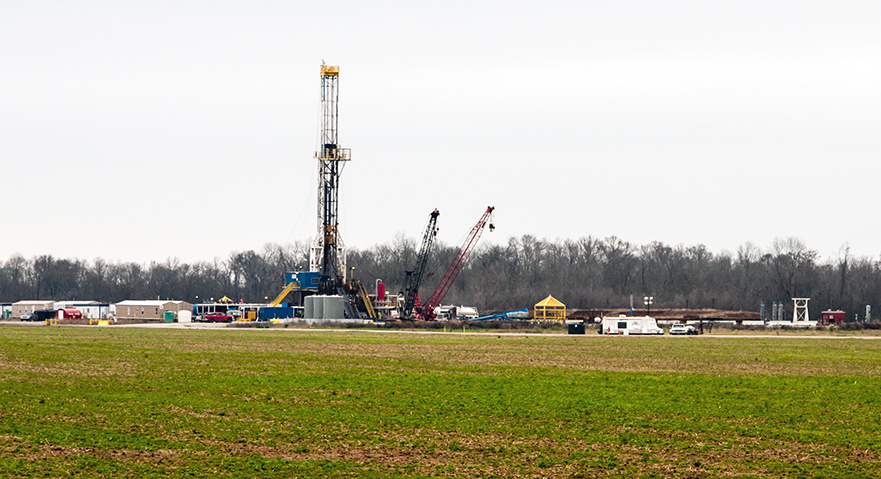
Hydraulic fracturing for natural gas was on the 2014 midterm ballot for many counties around the nation; Denton, Texas was one of several jurisdictions, which voted to ban it. (Photo: Daniel Foster; Flickr CC BY-NC-SA 2.0)
CURWOOD: What’s that, Peter?
DYKSTRA: Nothing! There isn’t any exit polling on climate change - what are you, crazy? It’s not that important to the pollsters. Actually, the Associated Press exit polls said climate change is on many voters’ minds, but the results don’t suggest it was on their ballots.
CURWOOD: Thanks so much, Peter. Peter Dykstra is the publisher of Environmental Health News, that’s EHN.org and DailyClimate.org. Thanks so much Peter, talk to you soon.
DYKSTRA: Thanks a lot, talk to you soon.
Links
Tom Steyer’s pro-climate action campaign funding didn’t match the Koch’s Big Oil money
Chevron poured money into a local Richmond, California election with no payoff
Outcomes of several climate and energy ballot initiatives from the 2014 midterm race
Lawsuit planned after Maui County voters approve temporary GMO ban
Texas Town's Fracking Ban Draws Legal Challenge From Energy Group
Food votes: GMO labels rejected in Colorado and Oregon; Berkeley taxes soda
Follow energy and environmental ballot measures by topic on Ballotpedia
Living on Earth wants to hear from you!
Living on Earth
62 Calef Highway, Suite 212
Lee, NH 03861
Telephone: 617-287-4121
E-mail: comments@loe.org
Newsletter [Click here]
Donate to Living on Earth!
Living on Earth is an independent media program and relies entirely on contributions from listeners and institutions supporting public service. Please donate now to preserve an independent environmental voice.
NewsletterLiving on Earth offers a weekly delivery of the show's rundown to your mailbox. Sign up for our newsletter today!
 Sailors For The Sea: Be the change you want to sea.
Sailors For The Sea: Be the change you want to sea.
 The Grantham Foundation for the Protection of the Environment: Committed to protecting and improving the health of the global environment.
The Grantham Foundation for the Protection of the Environment: Committed to protecting and improving the health of the global environment.
 Contribute to Living on Earth and receive, as our gift to you, an archival print of one of Mark Seth Lender's extraordinary wildlife photographs. Follow the link to see Mark's current collection of photographs.
Contribute to Living on Earth and receive, as our gift to you, an archival print of one of Mark Seth Lender's extraordinary wildlife photographs. Follow the link to see Mark's current collection of photographs.
 Buy a signed copy of Mark Seth Lender's book Smeagull the Seagull & support Living on Earth
Buy a signed copy of Mark Seth Lender's book Smeagull the Seagull & support Living on Earth

